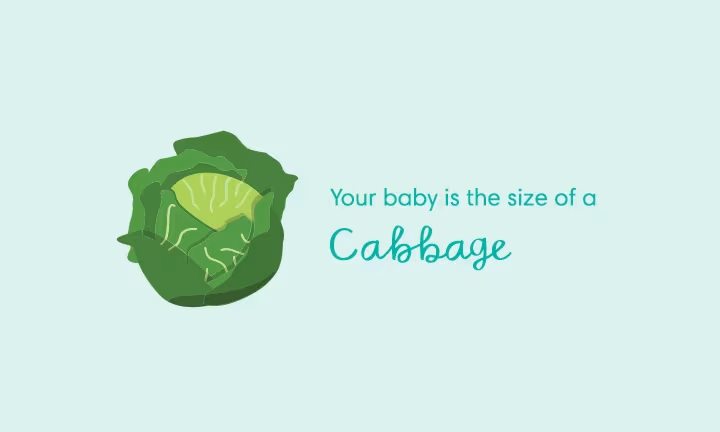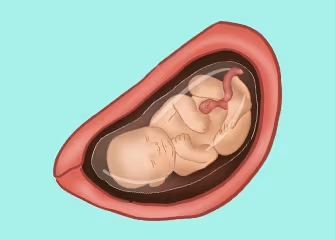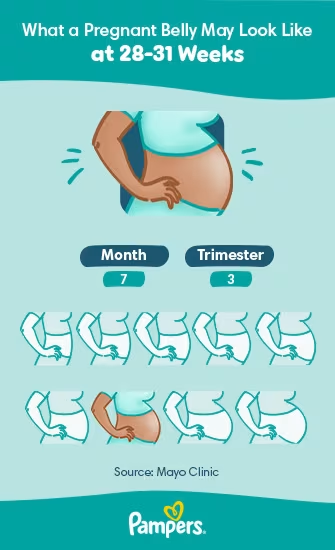30 weeks pregnant
Welcome to week 30 of your pregnancy! Being 30 weeks pregnant is a significant milestone — you're approximately seven months into your pregnancy and likely only have around 10 weeks left (give or take a week or two). At 30 weeks pregnant, your baby bump is likely very noticeable, and you might be experiencing an array of new symptoms. In this article, we'll delve into the unique experiences of being 30 weeks pregnant, discussing common symptoms, the size of your bump, and your baby's development.
Highlights at 30 Weeks Pregnant
Here are a few key highlights from 30 weeks of pregnancy:
At 30 weeks pregnant, your baby is about the size of a cabbage.
Your baby is plumping up as well as losing the fine hair (lanugo) that was covering their skin.
You might experience practice contractions (Braxton Hicks) around 30 weeks pregnant or in the next few weeks. Now’s a good time to learn the difference between real and practice contractions.
If you’re feeling stressed around 30 weeks, try some relaxation methods such as prenatal yoga, meditation, getting a gentle massage, or simply doing something you love.
If you still need to stock up on your newborn baby essentials, now might be a good time to research the best baby products out there.
Are you still deciding on a name for your baby? If so, try our Baby Name Generator for some inspiration:
BABY NAME GENERATOR TOOL
Baby name generator
By gender:
By theme:
Your Baby’s Development at 30 Weeks Pregnant
From your baby’s position in your womb to losing their lanugo, here’s what's going on with their development when you're at 30 weeks pregnant:
Your little one continues to gain weight at 30 weeks pregnant. A layer of insulating fat is now building up under your growing foetus’s skin, smoothing out some of the wrinkles.
The soft, fine hair called ‘lanugo’ that has covered your little one’s body since around week 21 is also starting to disappear. Most of the lanugo will be gone by your due date at the end of 40 weeks of pregnancy, although a few patches may still be there when your baby is born.
You’re probably feeling a lot of movement inside your bump at 30 weeks pregnant. Sometime in the third trimester, possibly in the next few weeks, your little one is likely to adopt a head-down position in readiness for birth.
Keep in mind that in some cases your baby might not turn downwards until just before delivery. It could also be that your little one doesn’t turn downwards by themself.
If your little one hasn’t got into the head-down position when labour starts or in the last week of your pregnancy, your midwife or doctor will discuss your options with you.
If your baby’s feet and bottom are pointing downwards when it’s time to give birth, this is called the ‘breech’ position. If your little one is lying sideways, you might hear your doctor or midwife talking about a ‘transverse’ position.
Keep in mind that some babies only turn at the very last moment, and it’s sometimes possible to turn a breech or transverse foetus into the head-down position too.
In some cases, you may be advised to consider a caesarean section, but having a breech baby doesn’t necessarily rule out a vaginal birth. Whether a caesarean is deemed safer depends on many other factors as well, including the size and exact position of your little one, how the feet are positioned, and the position of the placenta to name just a few.
Rest assured that at 30 weeks pregnant and beyond, your doctor and midwife will be keeping an eye on your baby’s position, to ensure that everything goes as smoothly as possible whatever position your baby is in.
If you’re 30 weeks pregnant with twins, learn more about your twin pregnancy.
How Many Months Is 30 Weeks Pregnant?
Are you wondering what 30 weeks pregnant is in months? Although there's no set way to group the 40 weeks of pregnancy neatly into months, at 30 weeks you’re likely in month 7.
In terms of weeks, you've reached a far more obvious milestone at 30 weeks pregnant: You're now three-quarters of the way until your estimated due date, which is at the end of 40 weeks. (If you're pregnant with twins or triplets, you're more likely to give birth a bit earlier, but your doctor and midwife are aware of this and will be monitoring your progress carefully.)
Your Baby’s Size at 30 Weeks Pregnant
Now that you’re 30 weeks pregnant, your baby is about the size of a cabbage, measuring close to 39.9 centimetres from head to heel, and your baby’s weight in kg is around 1.3 kilograms.
Your Baby: What Does 30 Weeks Pregnant Look Like?
For a glimpse at how your baby may be positioned at 30 weeks pregnant, take a look at the visual below. But remember, your little one may be changing positions over the next few weeks.
Your Body at 30 Weeks Pregnant
As your due date approaches, you may feel stressed or anxious from time to time. Relaxation techniques can help you feel and stay calm. You may want to try a few and see what works for you. Your midwife can give you some pointers to some good relaxation exercises.
Taking care of your mind and soul is just as important as keeping physically fit and sticking to a healthy diet.
For some pregnant people, getting a massage does the trick. Or you might like to unwind by listening to music, reading a book, watching a few episodes of your favourite TV show, or getting to a regular prenatal yoga class. Pregnancy, and the anxiety and stress it sometimes brings, can put a strain on the strongest of relationships. Even if neither of you have the time and energy to go off on great outings or adventures, sometimes just spending some quality time together can make all the difference.
Everyone is different. Sometimes a little ‘me time' will help you feel rejuvenated. Sometimes sharing your feelings and concerns with loved ones will help make you feel better.
If you're still feeling overwhelmed and nothing you try seems to work, ask your midwife or doctor for additional advice. There is help out there.
Your Symptoms at 30 Weeks Pregnant<H2>
Here are some of the symptoms you may be experiencing at 30 weeks pregnant:
Braxton Hicks contractions. If you occasionally feel a tightening in your belly at 30 weeks pregnant or any other time during your pregnancy, you may be experiencing Braxton Hicks, or ‘practice' contractions. These feel a little like regular contractions, but don't come at regular intervals. They usually last around 20-30 seconds before the muscles around your bump relax again. They may feel a little strange, but unlike the ‘real thing', they shouldn't hurt. If you find them uncomfortable, remembering that Braxton Hicks contractions are your body's way of gearing up for labour might help you feel a bit better about them. If you do experience period-like pains and cramps or regular contractions at this stage, call your midwife or doctor straight away, as this could be a sign of premature labour.
Itchy skin. If you're feeling the urge to scratch more often these days, you're not alone – this is fairly common among pregnant people. Pregnancy hormones are believed to be one cause, but at 30 weeks pregnant and beyond the stretching of the skin on your growing bump can also make the skin on your belly, thighs or breasts feel itchy. Wearing loose clothing may help relieve the itching, especially if it's made of natural, breathable materials. You could also try applying a soothing non-scented lotion or moisturiser, or take a cool bath. If you have persistent itching at 30 weeks pregnant or after, especially if it gets worse at night or mainly affects the hands and feet, talk to your midwife or doctor. In some cases, itching may be a symptom of a potentially serious liver condition known as intrahepatic cholestasis of pregnancy (ICP), which needs to be treated. Other signs of ICP may include dark urine and pale stools.
Diarrhoea. Although you may be taking extra steps to avoid it when you're pregnant, such as avoiding certain foods and steering clear of people who may have a stomach bug, there's still a chance you may get diarrhoea at 30 weeks or at any other time while you're pregnant. This could be accompanied by stomach ache or cramping. It's important to stay hydrated if you've got a runny tummy, so keep taking sips of water. Steer clear of fatty foods and dairy products until the diarrhoea clears up. If you're unable to eat or drink; or if you notice any signs of dehydration – such as constant thirst, dry eyes and mouth, dark and smelly pee or dizziness – get in touch with your doctor or midwife. Also, speak to your doctor if your diarrhoea lasts for more than a day or two.
Shortness of breath. The extra effort of carrying your growing bump around may be leaving you a little short of puff at 30 weeks pregnant, but your weight gain is only part of the story. Your growing uterus could start putting pressure on your lungs from below, making breathing more difficult. The good news is that in the last few weeks of your pregnancy, you may find breathing gets a little easier as your foetus drops down into your pelvis, easing up the pressure on your lungs. You may even be feeling that pressure down below at 30 weeks pregnant. But if not, the best thing you can do for now is take things easy and get plenty of rest. If you experience a sudden change in the way you breathe, or tightness or pains in the chest, call your doctor or an ambulance immediately.
Are you wondering what the symptoms of carrying a girl are compared to carrying a boy at 30 weeks pregnant? Well, we’re afraid you’ll have to keep on wondering because science has shown that pregnancy symptoms are not linked to the baby's assigned sex.
But, for some unscientific fun, read our article on Old Wives’ Tales for Predicting Gender.
What Size Is a Pregnant Belly at 30 Weeks?
As your baby continues to grow and rapidly gain weight, you may notice a lot of growth in your bump around 30 weeks pregnant and throughout this month. This may make your uterus feel heavier, and as we mentioned in the above section, it may push your stomach and diaphragm up toward your lungs.
What Does 30 Weeks Pregnant Look Like?
Here’s an idea of a pregnant belly size around 30 weeks pregnant. But remember, every bump is different. Your doctor or midwife may measure your bump around 30 weeks to ensure you and your little one are on track with your growth.
Things to Consider at 30 Weeks Pregnant
From babymoons to researching newborn baby essentials, here are some things to consider at 30 weeks pregnant:
If you were thinking about going for a 3D or 4D ultrasound scan, at 30 weeks pregnant it's worth making an appointment for the next couple of weeks, to get the best pictures of your little one inside your bump. The ideal time for 3D scans is between 25 weeks and 32 weeks of pregnancy. This is when your foetus is developed enough to have recognisable features, but still has enough room to move around in the uterus. This means that, with a bit of luck, the sonographer will be able to show your little one from various angles. Unlike the routine 2D scans offered for free on the NHS, you'll have to pay for a 3D scan. This technology uses computer wizardry to build up a three-dimensional picture of your little one from countless two-dimensional images. Moving pictures of your foetus can also be rendered – this is called a 4D ultrasound. There is no evidence that ultrasound can harm your foetus, but do talk to your midwife or GP if you have any concerns or questions about the potential risks of additional scans.
Got the travel bug at 30 weeks pregnant? If your doctor gives the all-clear, you may still have time before your little one arrives to go on a babymoon with your partner or take a trip with friends or family. So, can you fly at 30 weeks pregnant? If you plan to travel by air, you'll probably need a ‘fitness to fly' certificate from your doctor. Airlines have their own rules about how many weeks pregnant you can be and still fly with them. Now that you're 30 weeks pregnant, this means you need to check the airline's policy carefully before booking tickets and travelling. As a general rule, you're usually OK to fly until you're around 37 weeks pregnant, when the likelihood of going into labour increases. If you're pregnant with twins or triplets, however, you could be grounded sooner than this, at around 32 weeks pregnant. This is because multiples have a higher chance of being born early. Get more advice on travelling while pregnant from your midwife or doctor before heading off, no matter what your destination is and how you're getting there.
As at any other time during pregnancy, it's important to eat a well-balanced, nutritious diet at 30 weeks pregnant to support your little one's growth and ensure that both of you are staying healthy. An important part of your diet is calcium, an essential mineral for building your little one's bones and teeth. Dairy products like milk, cheese and yoghurt, as well as dark, leafy greens, are great sources of calcium. If you aren't getting enough calcium naturally in your diet, your doctor or midwife may recommend supplements. Depending on your situation, you may be eligible for free vitamins under the Healthy Start scheme. Ask your midwife whether you qualify.
Is your baby shower host pestering you for the details of your registry? Put the finishing touches on it so that they can finalise the shower invitations and send them out in time. Use our newborn baby checklist to make sure you’ve covered all the essentials.
If hypnobirthing interests you and you haven’t already signed up or started classes, ask your doctor or midwife for help on how to find a course that starts soon. Read more about hypnobirthing and its benefits here.
Tip for Partners
Now that you and your pregnant partner are in the third trimester, you’re probably making sure you’re prepared for your upcoming arrival. From car seats to cots, there are a lot of products out there, so completing your research is key. Look up the latest safety regulations for certain products and ask fellow parents for advice and the newborn essentials that they recommend.
Questions for Your Doctor at 30 Weeks Pregnant
Here are some questions that you might like to ask your doctor or midwife during this period:
Is it OK to go for a 3D or 4D ultrasound scan at 30 weeks pregnant? What are the risks and benefits? Where can you get these scans done?
Should I be worried about any cramping I’m experiencing at 30 weeks pregnant?
What’s a healthy amount of weight gain at this stage of my pregnancy? What can I do to stay on target?
When will I get the Tdap vaccination? This vaccine helps protect your baby from contracting whooping cough in the first few months after birth.
If I have been diagnosed with placenta accreta, what warning signs should I look out for during the third trimester and what are my chances of needing a caesarean section?
What are some symptoms not to ignore at 30 weeks pregnant? As well as asking your doctor, familiarise yourself with the signs of preterm labour.
FAQS AT A GLANCE
At 30 weeks, your baby’s major developments are complete. Although your little one is now fully formed, they still need to gain more weight and prepare themselves for the big wide world.
30 Weeks Pregnant: Your Checklist
Check out our short checklist for some things to do over the next few weeks:
☐ If this is your first pregnancy, ask your midwife whether you’ll have an antenatal appointment at 30 weeks, if it hasn’t already been scheduled.
☐ If you plan to travel home from the hospital or birthing centre by car, you’ll need a baby car seat for that first trip home and every other trip after that. If you don’t already have one that meets the latest safety standards, you’ll need to buy one. This is an important purchase, so it’s a good idea to start doing your research early. You’ll also need to make sure it’s properly installed and ready for the big day.
☐ Have you found the cot of your dreams yet? Will you need a baby monitor? What kind of pram will you have? Even at 30 weeks pregnant, it’s never too soon to start researching and buying some of the baby gear you’ll need after your baby is born.
☐ Soon enough, friends and family members may start offering to give you some extra support in the weeks after you give birth. Start jotting down some chores or tasks they could take on so that you know what kinds of jobs you could assign. Your list might include things like cooking a few meals that can be frozen for later, looking after your older children, doing the shopping, or taking care of pets. Don’t be afraid to ask for help if you need it.
30 weeks pregnant - checklist



